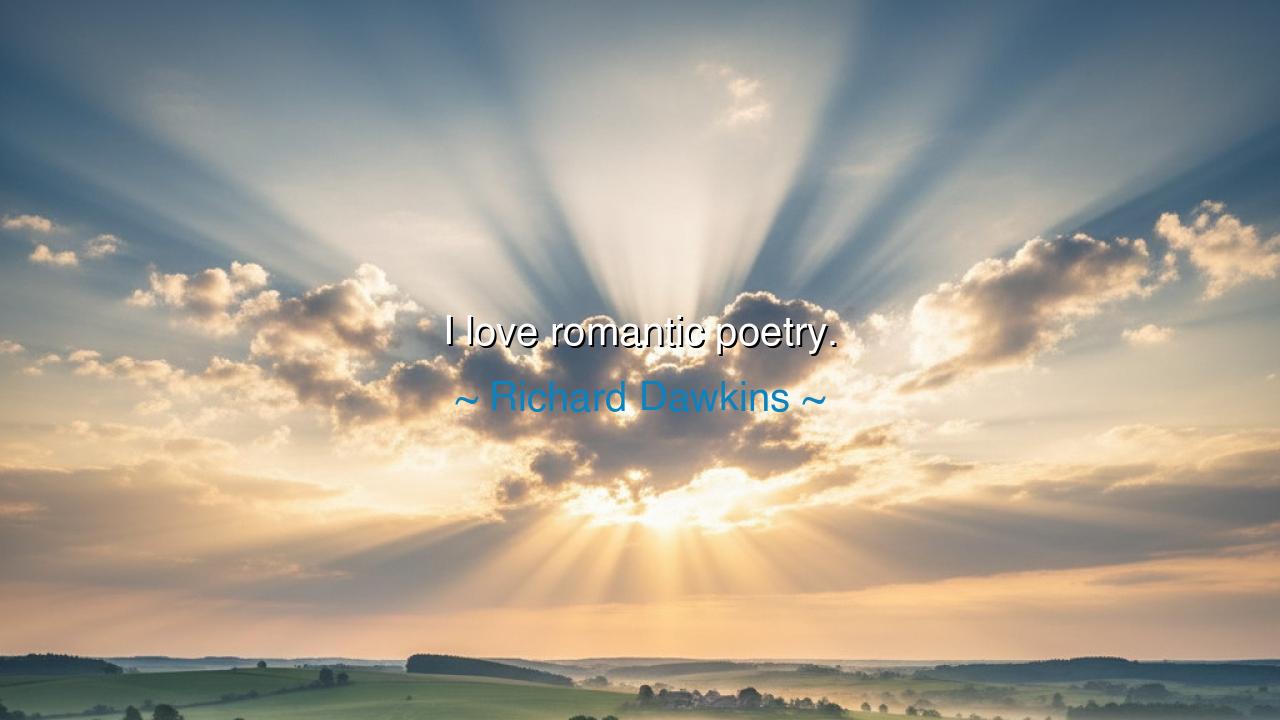
I love romantic poetry.






“I love romantic poetry.” Thus speaks Richard Dawkins, a man more often known for his devotion to reason and science than to the raptures of verse. Yet in these words lies a profound truth: that even the fiercest champion of logic finds himself moved by the romantic spirit when it is sung in poetry. For the heart, unlike the mind, does not live on proofs and arguments alone. It craves beauty, rhythm, and passion—the language of the soul expressed in words that rise above calculation.
To say “I love romantic poetry” is to confess reverence for the imagination. The Romantic poets of the eighteenth and nineteenth centuries—Wordsworth, Keats, Shelley, Byron—rose against the cold weight of rationalism. They sought to remind the world that truth is not found in numbers alone, but in the grandeur of mountains, the softness of a lover’s touch, the fleeting brilliance of a star. Their poetry was not only art, but rebellion: a protest against a world that had grown too mechanical, too bound by reason, too deaf to the whispers of the human heart.
The ancients, too, revered poetry as more than ornament. For Homer was not merely a singer but a prophet of identity and meaning; his verses shaped the very soul of Greece. The Psalms of David, though born of sorrow and longing, became songs of a people’s spirit. Poetry, especially when imbued with romantic longing, has always been the vessel through which humanity remembers that life is not survival alone, but wonder. Dawkins, in admitting his love, stands in the line of these ancients: he acknowledges that poetry can move us in ways science alone cannot.
History offers us vivid examples of poetry’s power to stir the heart. Consider the words of John Keats, who, though he died young, gave the world odes that still breathe with passion. His “Ode to a Nightingale” speaks of longing to escape life’s pain through beauty, and in those lines countless souls have found their own yearning echoed. Or think of Shelley’s “Ode to the West Wind”, which transformed the changing of seasons into a cry for revolution and renewal. Such works remind us that romantic poetry is not mere decoration, but a force that shapes how we see ourselves and the world.
Dawkins’ love of romantic poetry also points to a greater harmony: that science and poetry need not be enemies. Where science dissects, poetry unites; where science explains, poetry evokes. A scientist may describe the chemical reactions of the stars, but the poet reminds us why we lift our eyes to them with awe. Together, they serve the fullness of the human spirit. In this, his confession of love is not contradiction but completion: even reason bows before beauty.
The lesson here is simple yet deep: do not live by logic alone, nor by passion alone. Let romantic poetry remind you to feel, to wonder, to be moved beyond the limits of the rational. Read the verses of those who wrote with burning hearts, and allow them to kindle your own. Speak poetry to those you love, or even to yourself, for it awakens a part of the soul that prose cannot touch.
Therefore, dear listener, take these words as guidance: embrace both the precision of reason and the fire of romance. Read the poets; let their words sing within you. And when life feels cold, return to romantic poetry, for it is the eternal flame that warms the spirit, carrying forward the truth that beauty is as essential to our humanity as knowledge. For in the end, the heart that loves poetry is a heart that remembers how to live.






AAdministratorAdministrator
Welcome, honored guests. Please leave a comment, we will respond soon